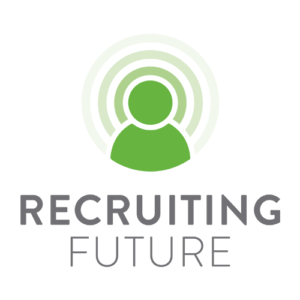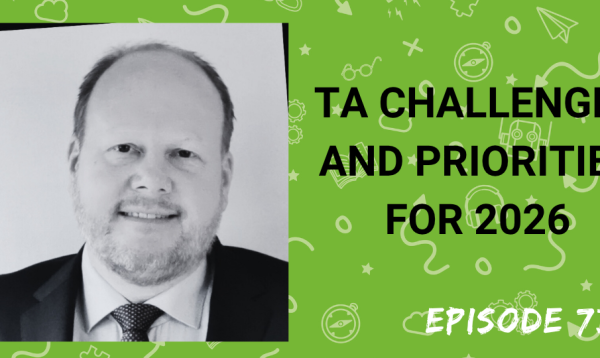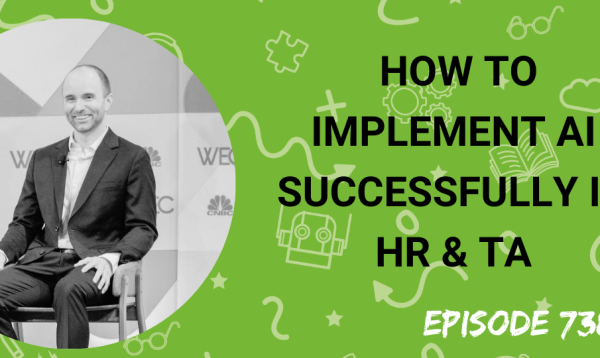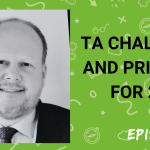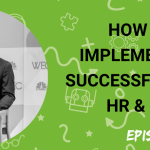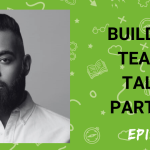I’m delighted to have Kathryn Minshew as my guest on the show this week. Kathryn in not only the Founder and CEO of careers platform The Muse, she is also a best-selling author. Her book, The New Rules of Work was published earlier this year and provides brilliantly practical advice on managing a career in our ever changing world of work.
As well as providing some fantastic careers content The Muse also works with a large number of employers on employer branding, candidate experience and recruitment marketing and these are the themes we cover in our conversation.
In the interview we discuss:
• The most effective ways employers can acquire talent
• The importance of employee story telling and advocacy
• The culture driven employment market
• Employee experience as a differentiator and why it isn’t about perks
• Experimenting with content formats for storytelling
• Relationships over transactions
Kathryn also shares some brilliant examples from employers who are getting it right and gives her view on how companies will connect with talent in the future
Subscribe to this podcast on iTunes
Transcript:
Matt Alder [00:00:00]:
Support for this podcast is provided by Smart Recruiters, the hiring success company Smart Recruiters is a full talent acquisition suite with candidate relationship management and an applicant tracking system all in one modern platform. With an extensive marketplace of more than 300 vendors and a user experience that candidates, hiring managers and recruiters alike love. Companies from Ikea to Bosch to blah blah Car leverage Smart Recruiters to attract, select and hire the talent they need to grow and expand their business. Visit smart recruiters@www.smartrecruiters.com to find out why companies across the globe consider them to be the number one ATS replacement.
Matt Alder [00:01:08]:
Hi everyone, this is Matt Alder. Welcome to episode 109 of the Recruiting Future podcast. I’m delighted to have Kathryn Minshew and as my guest this week, Kathryn is not only founder and CEO of careers platform the Muse, she’s also a best selling author. Her book the New Rules of Work was published earlier in the year and provides some brilliantly practical advice about career management in our ever changing world of work. As well as providing some excellent content, the Muse also works with a number of employers on employer branding, candidate experience and recruitment marketing. And these are just some of the themes that we cover in our interview. Hi Kathryn and welcome to the podcast.
Kathryn Minshew [00:01:55]:
Thank you so much. I’m so excited to be here.
Matt Alder [00:01:57]:
Fantastic to have you on the show.
Matt Alder [00:01:59]:
Could you just introduce yourself and tell.
Matt Alder [00:02:02]:
Everyone what you do?
Kathryn Minshew [00:02:03]:
Absolutely. My name is Kathryn Minshew and I’m the founder and CEO of TheMuse.com, which is a career platform that helps over 50 million people navigate their careers every year. And career advice. We help with job search, moving up within a company, getting a promotion, anything and everything that people need to navigate their career. And then on the flip side, we work with about 700 of the most recognizable, best companies in the world from you know, the sort of Facebook, Slack, Dropbox technology set to finance Goldman Sachs, Capital One, consumer goods, hospitality, et cetera, et cetera, et cetera. And we help them really articulate their employer brand and their talent brand, create and capture materials and stories and assets around that, distribute those through all of their recruitment channels and then measure the impact on talent acquisition, candidate experience, and eventually in the future, employee engagement.
Matt Alder [00:03:01]:
Now I want to talk a little.
Matt Alder [00:03:03]:
Bit more about your sort of views around talent attraction and employer branding. But before we do, you recently published a book called the New Rules of Work. Could you talk A little bit about that. I’m interested to know what the. What the news, what the new rules of work are.
Kathryn Minshew [00:03:23]:
Absolutely. So my business partner and I came out with the book in April. We made the Wall Street Journal national bestseller list, which was very exciting. And the idea behind the new rules of work was to write a definitive playbook to the modern workplace. This concept that the rules of the game are changing, and both candidates and companies need to understand what the new rules are and how to up their game. So on the candidate side, we talk through things like, how do you discover your career values and find a path that’s right for you, not right for your friend, not what someone else or your parents think you should do. How do you really navigate the job search and land a job you’re excited about and then succeed at the career you’ve always wanted? So the new rules of workplace communication, including group chat like Slack and Hipchat, including sort of video interviews, and also some of the more casual rules around relationships and navigating office politics. We also then have spent a lot of time talking to employers about what are the new rules for hiring and recruiting? Why is it that slapping a job post on the Internet and hoping the best talent in the world is gonna waltz right up your door isn’t working anymore. So how instead do you craft a compelling employer story? Do you get that out there through the right mediums, make sure the right message is reaching the right person, and really use the full spectrum of recruitment, marketing, talent, branding, employee advocacy to really engage and develop relationships with candidates throughout their journey so that you have access to the right people at the right time for your business.
Matt Alder [00:05:02]:
I think that’s really interesting because, you know, I’ve read the book, and I think it’s great in terms of, you know, how it kind of really, I suppose, defines what. What works like these days and how it’s changed and what people need to think about when they’re looking to build a career and they’re looking for a job? From the employer perspective, you mentioned sort of quite a few things there that employers might be thinking of to get the best talent to their organization. Which do you think are the most effective and most important? What are employers doing that really works for them in this kind of the new sort of world of work that we’re currently in?
Kathryn Minshew [00:05:46]:
Absolutely. The first thing I would highlight is employee storytelling and employee advocacy. So what I mean by that is it’s well proven that most individuals today, particularly millennials, do not trust brands. They trust other people. In fact, a Recent survey of which I believe the exact question was, which sources do you go to to learn about a particular company? And how do you measure the trustworthiness rated? A variety of things. The CEO, senior executives, career page, social media channels, other employees, etc. And again and again, employees come out on top. People want to hear the real stories of real employees at your organization, and that’s how they’re going to decide whether it’s a good fit for them. And so I think this is creating some really exciting opportunities for companies who are able to take advantage of it. So, for example, we actually at the Muse, made an acquisition earlier this year. We acquired this incredible company formerly called Brand Amper. We renamed it Brand Builder. But the idea is, how do you go into a population of 200, 2000, 20,000 employees and source the best stories, the best content, find the evangelist for your organization, and then understand what is it that they might say? And so we’re able to actually pull out all of these individual stories of why somebody does what they do, what values about your organization really resonate with them. And then you get this fascinating amount of. It’s sort of the art and the science, right? The data and the anecdotes that tell you this is how your organization is interacting with your culture. This is what the employee experience looks like at a high level. And then these are some of the very specific stories. Anyway, when you get that sort of information, regardless of whether you source it through employee focus groups, if you’re a smaller company, you may be able to send out a simple survey. But once you have a sense of what employees really value in your company, in your organization, in your employer brand, you can use those stories and that language to do a number of things. You can improve your job descriptions. You can better arm your recruiters, you can revamp the language and the examples that you give on your career pages, and then you can fill your social channels again with photo, video and text, real stories from real people at your team. So I could go on, but that’s probably enough talking for that question.
Matt Alder [00:08:12]:
I think that’s interesting because, you know, what we’re really talking about there is, you know, employer brand that sort of reflects the genuine employer experience. So, I mean, would you sort of see employer experience as the employee experience as a sort of key differentiator? And if it is, what do companies need to be aware of in terms of how they might sort of optimize the employee experience in the first place and then sort of communicate what that is?
Kathryn Minshew [00:08:48]:
Yeah, absolutely. So first, this is critically important for employers to understand. Three out of four millennials care about culture fit. 94% of millennials care about meaningful work. And actually, I think the Most fascinating stat, 44% of millennials turned down a job offer because they didn’t feel that the organization’s values aligned with their own. So this concept of values driven or culture driven employment market is upon us. And when you look at how that plays out, I think it means that as you said, employee experience is a huge differentiator. That’s not about the perks. I think it could be very easy to say, well, we don’t have the money for free snacks, so how are we going to compete with the Googles of the world? But when we look at data from themuse.com from our community, it’s not the fancy, snazzy perks that are attracting individuals to your company. It tends to be things much more core to the employee experience. So we often use an acronym called the three Ps people, purpose and path. But just very quickly, the idea being that who are your people? Who will be, you know, if someone’s going to come join your organization, who are going to be their colleagues? What sort of people will they learn from work with? See in the lunchroom every day? That’s a very powerful motivator. The people and obviously the relationships that come from that purpose. Second, what’s the ultimate goal of your organization? How does their role fit within that? What’s the purpose of it all? This can be very lofty, it can be very tactical and very concrete. But tying what they’re doing and what your organization does to some sort of larger purpose, and then three path opportunities for growth and development. So what sort of skills might someone acquire by coming at your joining your company? What sort of experiences might they have? There’s a tremendous amount that I believe almost any employer can do to figure out for your current employee base. What is it that keeps them waking up in the morning and coming into work? What is it that they might tell their friends about your organization? And how do you tell those stories on a broader scale? Because this trend is here to stay. And I think companies that invest in creating a solid employee experience and then understanding how to talk about it in the marketplace are going to consistently be more successful. Attracting great talent?
Matt Alder [00:11:05]:
Definitely.
Matt Alder [00:11:06]:
I think that makes a, that makes a huge amount of sense. And I think what’s interesting as well is that a lot of the coverage that we see around employee experience, you know, certainly in the last five years or so has tended to Focus on employers that are giving amazing perks, whether it’s kind of unlimited holiday or, you know, whatever that might be. And obviously that isn’t, you know, that’s just a kind of a side issue to the things that are really important, you know, not to want to put you too much on the spot here. But which companies do you think do this really well in terms of communicating, you know, a really sort of compelling employee experience?
Kathryn Minshew [00:11:46]:
Yeah. So a couple examples that come to mind. Pandora has a great hashtag life. At Pandora, I believe it’s through their Instagram account that just allows for some very real candid photos of the employee experience to be shared through social. We also at the Muse wrote a great white paper on employee advocacy. And particularly we highlighted some of the work that GE is doing around social media and the extensive training that they’re offering for a number of their employee advocates, which they call brand ambassadors, in order to help them understand how to optimize their LinkedIn, how to be out there, are on social and active, engaging in a way that’s going to support some of the company’s goals. And they’ve done a really nice job so far of, you know, of both implementing this training and these sort of best practices internally, but then also talking about them so other companies can learn. I think, you know, another great example, I will say Instagram. I think as much as it’s a platform that is a little bit smaller and that some companies aren’t active on yet, it can be such a powerful tool. Another example of a great hashtag gap has wearegapinc. There are over 7,000 Instagram posts with that hashtag. And again, you know, when you look at social media use among young people, Instagram is tremendously popular with the millennial generation and with many of those in Gen Z as well. You can also do a lot of really interesting things with a company blog. So I think one of the examples we call out in the white paper as well is Pinterest. They have PinterestEngineering on Medium, and they write a blog with a combination of photos, articles, details about what is it like to be an engineer at Pinterest. And there’s only a few examples. There’s hp, Cisco, a number of other companies, big and small are doing this well. But that should give people a bit of a taste for what it can look like.
Matt Alder [00:13:53]:
I think the interesting thing about that is the different kind of formats and ways that companies are sort of choosing to tell their stories there. Now, I know that the Muse puts out kind of a huge amount of content. It puts out some great content. And I suppose what’s interesting to me is what. What formats do we think are most effective? You obviously kind of mentioned Instagram and pictures and that kind of stuff, but some companies tend to sort of rely on text. Some companies, you know, will use photos. But do the photos actually convey everything they’re going to try and get across? What are your sort of views on formats for storytelling?
Kathryn Minshew [00:14:34]:
Yeah. So firstly, I think the format has to fit the medium and the message, which means that no single format is going to be the silver bullet for everything you’re trying to communicate. That’s why I think it is important to experiment with a variety of different formats. Here at the Muse, we are huge fans of video. I don’t have the stats at my fingertips, but there’s. There’s just been some fascinating research that people spend, you know, something like three times as long on a page with video as a page without. They’re more likely to come back, they’re more likely to develop brand affinity. Video is very powerful because, you know, there’s that old expression, a picture is worth a thousand words. If that’s true, you know, how much more context can you get from a video? And I don’t think this necessarily has to be high concept. You know, highly produced. Sometimes something that’s very simple, just one of your employees talking about an element of your culture or a tradition or a value that’s core to the company can be really powerful. But we do produce a lot of video at the Muse. We encourage our clients and our partners to use video in all of their channels because it is just so sticky and so engaging and it really gives people that sort of deeper glimpse. That said, I think text and photos have their place. And again, it depends on the platform. Twitter is great for sharing articles that might reflect some of your values. You know, a quick photo and a quote from an employee. It doesn’t have to be long form content. In fact, sometimes keeping it short and sweet is more effective within a specific medium. Whereas obviously, we know Facebook’s algorithms really prioritize video. And I think video on career sites can be very helpful as well, because people are going for a deeper look and video is one of the most effective ways to do that. But it really depends on what are your goals for that specific platform, what message are you trying to communicate, and what are your audience’s expectations based on where they’re finding you, social media, your own platform, etc.
Matt Alder [00:16:28]:
So, final question, where are we going next? What does the future of the future look like for work and the future look like for companies connecting with great talent? How do you think the world’s going to kind of look like in 18 months, 2 years time?
Kathryn Minshew [00:16:47]:
If I had to summarize it in 3 words, I’d use relationships over transactions. I think that the best companies are going to continue investing in developing relationships with great talent over time and they’ll be moving away from this very transactional model of, you know, filling jobs, getting butts and seats, sorting through a whole bunch of resumes. This is having wide ranging implications on the entire talent space because firstly, within talent attraction, it changes how you need to attract candidates. Again, it’s not enough to just post a job. You need to include information about why your organization, why someone talented with a lot of options is going to be drawn to you. That can be employee stories, your company values, what you stand for, the people, purpose and path, etc. But it’s a much more storytelling rich, content focused view into talent attraction. Then there’s the future of candidate experience. We work with a lot of companies at the Muse, that many of these Fortune 11000 companies, it’s not unusual for them to need to turn down over a million applicants a year because of the volume of applies that they get. And that’s just a fact of the game. But what is changing is, you know, how, what is the impression that those people have if they don’t get a job at your company? And this is, to be honest, this is equally true for very small companies that might have applicants in smaller numbers. Every single person that applies has taken time out of their day to say, I might want to work for you. And I think we’re starting to see that there’s, you know, it’s something like 40% of people that have a negative employer experience would sever their relationship with that company. So whether you’re B2C or B2B, regardless of who your customer is, unless you want a large number of people walking around and feeling like they don’t want anything to do with your brand, it pays to start thinking about how do you invest in candidate experience. And interestingly, you know, the Muse started as a platform that purely offered tools and software for talent acquisition and for recruiting. That was at the core of our business. We’ve actually built out a candidate experience product because we’re hearing about it so consistently from both sides of our marketplace, from companies that are saying, you know, this is an area where I need help. This is an area where I really want to stand out over my competitors and individuals are saying candidate experience matters to me whether I get the job or not. And again, you know, these talented people, they’re going through a number of companies candidate experiences at the same time. And of course, don’t you want yours to stand out so that when it comes time to make the offer they’re more likely to accept? I won’t even go into right now how this theme impacts employee experience in detail, but I think across the talent life cycle, we’re seeing this theme of relationships over transactions really leading the way in terms of how the most innovative companies are engaging with their talent, how they’re speaking with candidates, and how they’re treating their employees. And I think that while it’s certainly a brave new world out there, I also really believe that for all of us working in hr, this gives us some really exciting opportunities to be part of the future of what you know, how is talent attracted to companies? How do we engage, develop, retain them and build a relationship with great people over time?
Matt Alder [00:20:03]:
Kathryn, thank you very much for talking to me.
Kathryn Minshew [00:20:05]:
Thank you so much for having me. Take care.
Matt Alder [00:20:08]:
My thanks to Kathryn Minshew. You can subscribe to this podcast in itunes on Stitcher or download the show app on your smartphone. Just search for Recruiting Future in your app Store. You can listen to all the past episodes@www.rfpodcast.com on that site. You can also subscribe to the mailing list and find out more about Working with me. Thanks very much for listening. I’ll be back next week and I hope you’ll join me.


